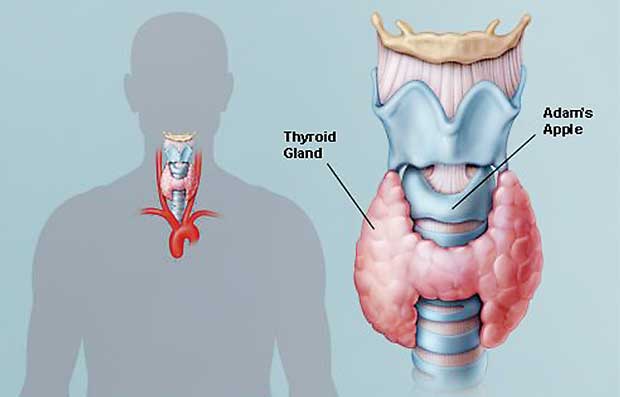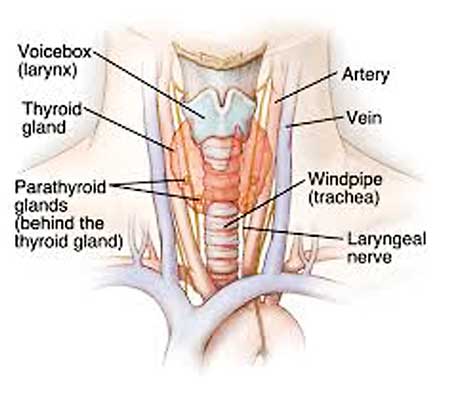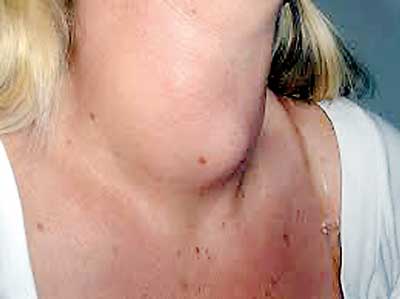23 Feb 2018 - {{hitsCtrl.values.hits}}
 Through the hormones the thyroid gland produces, it influences almost all the metabolic processes in the body. The thyroid gland takes the shape of a butterfly and is situated in the front of the neck. Different types of thyroid disorders affect either it’s structure or the function.
Through the hormones the thyroid gland produces, it influences almost all the metabolic processes in the body. The thyroid gland takes the shape of a butterfly and is situated in the front of the neck. Different types of thyroid disorders affect either it’s structure or the function.
The thyroid gland is located below the Adam’s apple wrapped around the trachea. A thin area of tissue in the gland’s middle, known as the isthmus, join the two thyroid lobes on each side. The thyroid uses iodine to produce vital hormones. Thyroxine, also known as T4, is the primary hormone produced by the gland. After delivery via the bloodstream to the body’s tissues, a small portion of the T4 released from the gland is converted to triiodothyronine [T3], which is the most active hormone.
The Health Capsule spoke to Dr. Muditha Weerakkody, Consultant Endocrinologist at the Teaching Hospital Karapitiya, Galle with regard to the function of the thyroid gland and the corns of thyroid disorders.

“The function of the thyroid gland is regulated by a feedback mechanism involving the brain. When thyroid hormone levels are low, the hypothalamus produces a hormone known as thyrotropin releasing hormone [TRH] that causes the pituitary gland to release thyroid stimulating hormone [TSH]. Since the thyroid gland is controlled by the pituitary gland and hypothalamus, disorders of these tissues can also affect thyroid function and cause thyroid problems.
Specific kinds of thyroid disorders
Hypothyroidism
It is a result of producing an insufficient amount of thyroid hormone. It can develop from problems within the thyroid gland, pituitary gland or hypothalamus. Symptoms of hypothyroidism includes:
• Fatigue
• Poor concentration or feeling mentally “foggy”
• Dry skin
• Constipation
• Feeling cold
• Fluid retention
• Muscle and joint aches
• Depression
• Prolonged excessive menstrual bleeding for women
Some common causes of hypothyroidism include:
• Hashimoto’s thyroiditis – it is an autoimmune condition that causes inflammation of the thyroid gland.
•Other types [inflammation of the thyroid] such as acute thyroiditis and postpartum thyroiditis.
Hyperthyroidism
Hyperthyroidism is described as the excessive production of thyroid hormone, a less common condition than hypothyroidism. Symptoms of hyperthyroidism usually relate to increased metabolism. In mild cases, there may not be apparent symptoms.
Symptoms and signs of hyperthyroidism can include:
• Tremor
•Nervousness
• Fast heart rate
• Fatigue
• Intolerance for heat
• Increase in bowel movements
• Increased sweating
• Concentration problems
• Unintentional weight loss
Some of the most common causes of hyperthyroidism include:
• Toxic multinodular goiter
• Graves’ disease
• Thyroid nodules that overexpress thyroid hormone known as hot nodules.
• Acute inflammation of the thyroid gland causes transient hyperthyroidism.
Goiter
 A goiter is described as the enlargement of the thyroid gland, regardless of a cause. A goiter is not a specific disease. A goiter may be associated with hypothyroidism, hyperthyroidism or normal thyroid function.
A goiter is described as the enlargement of the thyroid gland, regardless of a cause. A goiter is not a specific disease. A goiter may be associated with hypothyroidism, hyperthyroidism or normal thyroid function.
Thyroid nodules
Nodules are lumps or abnormal masses within the thyroid. Nodules can be caused by benign cysts, benign tumors or by cancers of the thyroid. Nodules may be single or multiple and can vary in size. If nodules are excessively large, they may cause symptoms related to compression of nearby structures.
Thyroid cancer
Thyroid cancer is far more common among adult women than men or youth. About 2/3 of cases occur in people under age 55. There are different kinds of thyroid cancers, depending upon the specific cell type within the thyroid that has become cancerous. Most cases of thyroid cancer have a good prognosis and high survival rates, especially when diagnosed early.
Treatment
This can be treated by medication or surgery. The treatment will depend on the particular disease of the thyroid.
Medications
Medications can be given to replace the missing thyroid hormone in hypothyroidism. Synthetic thyroid hormone is given in pill form by mouth. When hyperthyroidism is present, medications can be used to decrease production of thyroid hormone or prevent its release from the gland. Other medications can be given to help manage the symptoms or hyperthyroidism, such as increased heart rate. If hyperthyroidism is not controlled by medications, radioactive ablation can be performed. Ablation involves giving doses of iodine labeled with radioactivity that selectively destroys the thyroid tissue.

Surgery
This can be used to remove large goiter or a hyper functioning nodule within the gland. Surgery is necessary when there is a possibility of thyroid cancer. If the thyroid gland is removed entirely, the individual will need to take synthetic thyroid hormone for life.
Thyroid surgery can also be used in Graves’ Disease and was the treatment of choice prior to RAI therapy and anti-thyroid medications.
The viewpoint for thyroid disorders
In most circumstances, thyroid disorders can be well managed with medical treatment and are not life threatening. Some conditions may require surgery. The outlook for most people with thyroid cancer is also good. However, patients whose thyroid cancer has spread throughout the body may have a poorer prognosis.
23 Dec 2024 43 minute ago
23 Dec 2024 1 hours ago
23 Dec 2024 1 hours ago
23 Dec 2024 1 hours ago
23 Dec 2024 2 hours ago